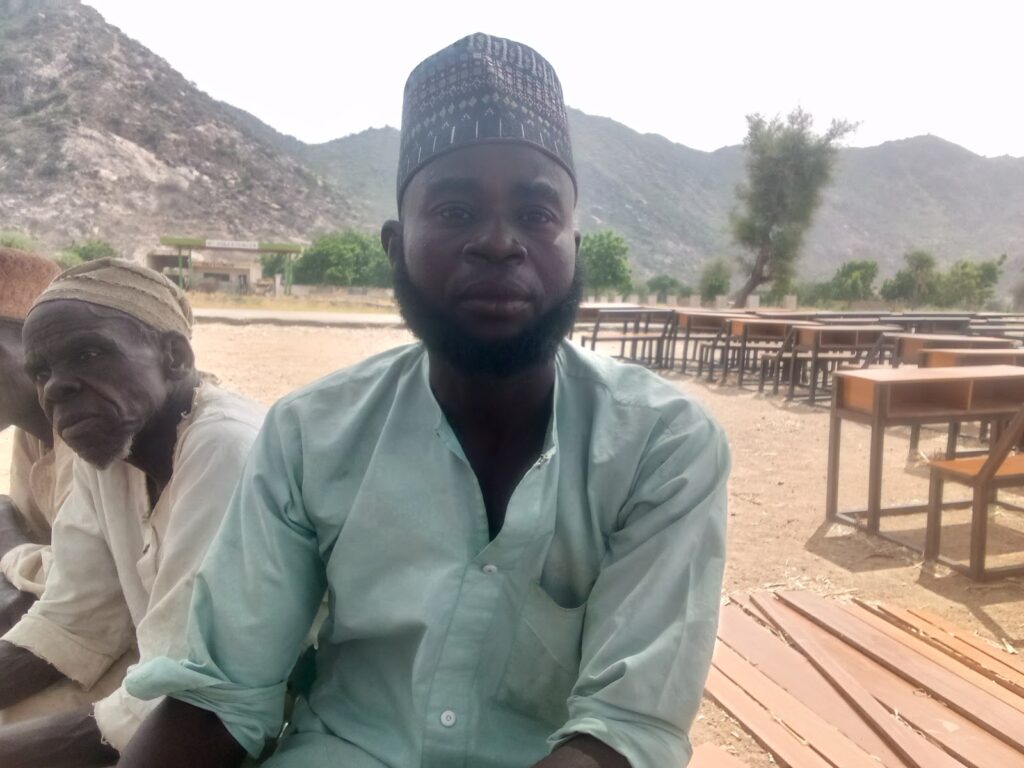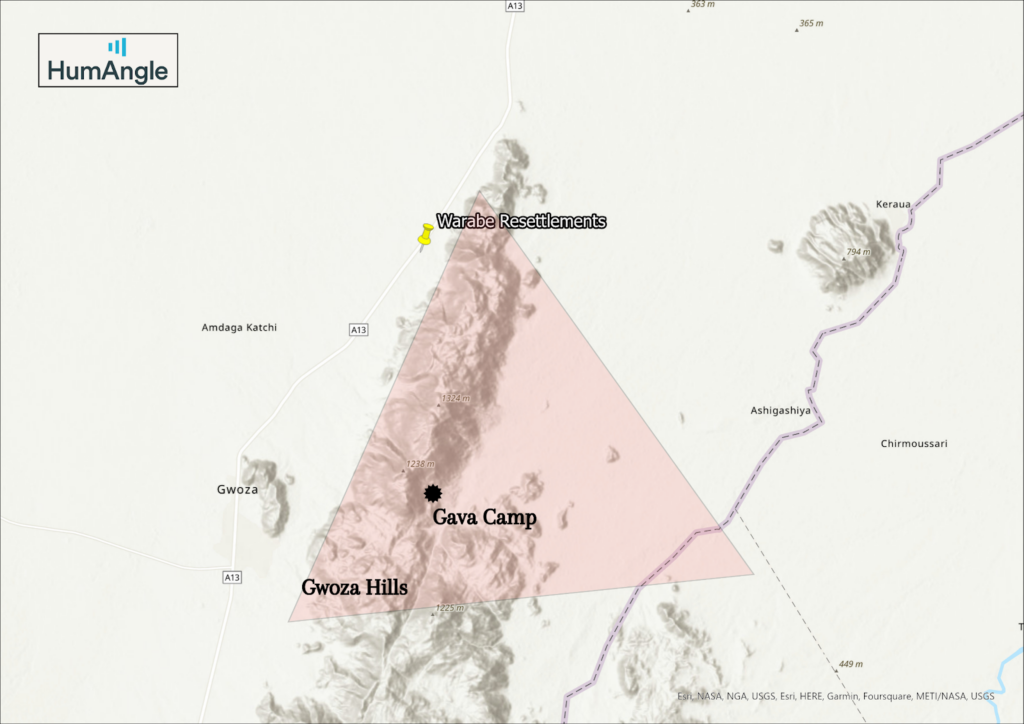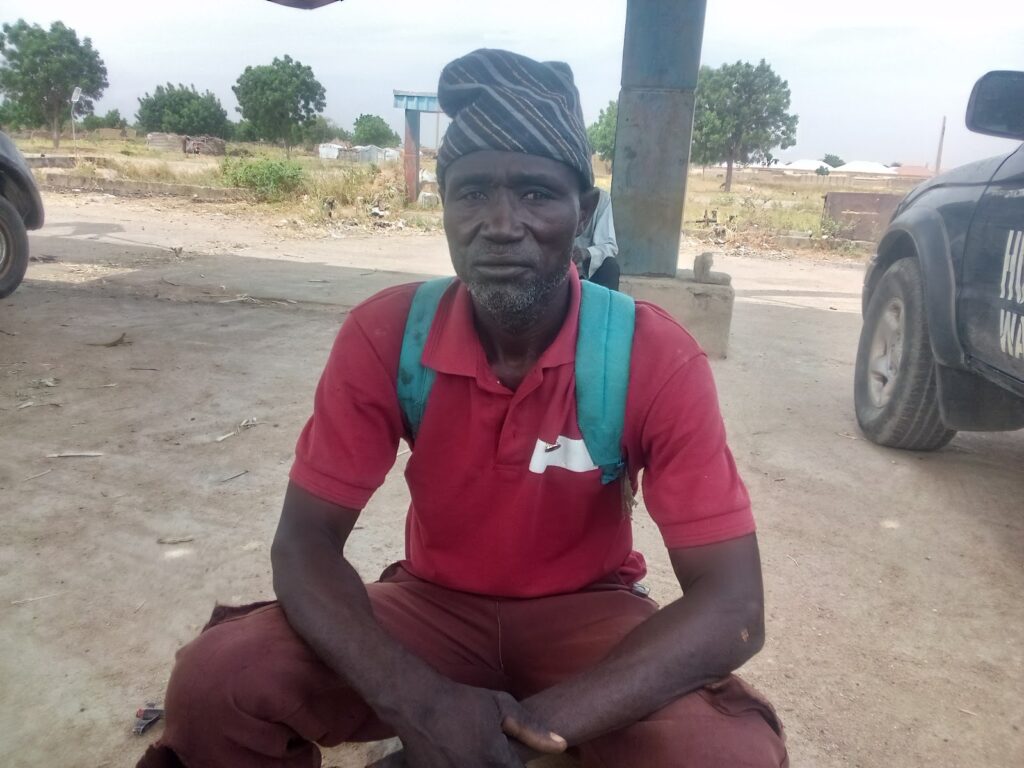The youth of Warabe should have been scared to death.
Over 50 terrorists, on motorcycles and bicycles, firearms blazing, stormed their settlement. They, on the other hand, were just about 30 in number and under-armed.
What could seven pump-action rifles do to battle-tested insurgents who had probably seen more violent encounters than they could count?
Warabe’s story begins after its people returned to their settlement in Borno, northeastern Nigeria, eight years after the same terrorists forced them out.
One of those who dared to return is Bulama Abdu. This return, for him, means enduring battles on two fronts. On the one hand, is the horror that lives in his mind, the incidents that drove him and several more away from their homeland. These are visible in the skeletal remains of his family home. Then there is the other, the terrorists around them, embedded in settlements that remain their stronghold.
Back then, the people had endured attacks until 2015, when a third episode by Boko Haram proved to be the last that crippled their resolve. In that attack, Abdu lost his uncle and two close friends.
“I still recall when the insurgents stormed our village with their weapons blazing. The experience was terrifying, throwing our once peaceful home into disarray,” he narrates.
The brutality of the invasion left an indelible mark on their lives, shattering the fabric of a once close-knit community. Families scattered, seeking refuge amidst the dense bushes surrounding the village.
“l found myself separated from my family. I could not get any news about them until after three months when I found out that they were sheltered at Bakassi camp in Maiduguri,” Abdu tells HumAngle.
The protracted insurgency in the region has left numerous villages in Borno State abandoned, either falling under insurgent control or becoming desolate. Recent relative calm in some parts of the state prompted the Borno State government to initiate plans for the resettlement of displaced communities. The government asserted that restoring normalcy is paramount and envisions a return to farming as a means to boost food production in the state.

Returning to battle
In adherence to this commitment, communities such as Nguro Soye in Bama Local Government Area (LGA), Ngoshe, Kirawa, and Warabe in Gwoza LGA were included in the resettlement efforts.
This was how, eight years later, Abdu returned to his ancestral home, only to find the remnants of what was once a cherished community. His family house, a poignant symbol of past delights, including his wedding celebration, now lies in ruins.
“See! This was exactly where my wedding reception was held, it was my family house, as you can see, it has been reduced to rubbles.” He stood amidst the rubble, his eyes misty with tears and nostalgia.


The returning residents of Warabe, once displaced to Pulka, Gwoza, and Maiduguri camps, faced a significant challenge upon their return. Their proximity to insurgent camps in the Gwoza hills leaves the town vulnerable to attacks, compounded by the absence of military or police protection.
However, undeterred by the lack of official defence, the residents, driven by an unwavering desire to reclaim their ancestral homes, took matters into their own hands.
Literally every young individual in Warabe has embraced the role of a security member to ensure the safety of their women and children.

Not backing down
Once, in the delicate hues of the sunset, just as they were about to commence the Maghrib prayers, the serenity of the community was abruptly shattered by the ominous echo of approaching gunshots.
“When we heard the gunshots approaching, no one actually thought of running; what we did was ask women and children to enter their houses, and then we swung into action,” a resident, Kachall Amodu, narrated.
Without hesitation, the youth rallied together. There was no panic, no instinct to flee, Amodu recalled.
But this was no impromptu response. Since they returned, the locals were certain that the insurgents would strike. “We knew they would come, so we prepared ourselves mentally, physically, and spiritually to confront them, and we thank God we defeated them.’ Abubakar Ghide, another resident, added.
And so, just a month after the locals returned, the first attack came. At the time, only a handful of the youth had mustered the courage to return to the settlement. Merely about 30 youths were active, armed with just seven pump-action rifles. “It was scary, but we knew we had to stand up to them no matter what; even with the shortage of arms, we were courageous enough to take them on,” Amodu continued. To make up for this deficiency, they devised a strategy. When asked about the strategies used, Amodu said that they prefer to keep it under wraps.
But it still was not easy.

The insurgents, numbering over 50, stormed the community with relentless fury and the determination to wreak havoc. The odds were stacked against the locals, but through sheer valour and determination, they successfully repelled the attack. “It was quite difficult, especially because we were under-armed and out-numbered, but we succeeded with the help of God.”
After about an hour of exchanging gunfire, the terrorists yielded to pressure and retreated from the community. They lost five members that day. “This very incident was the reason why the governor supported us with additional firearms to enable us to defend our community,” Hassan Muhammad, another Warabe resident, told HumAngle. These included 70 pump-action rifles, 14 AK47 rifles from the military, and critical communication gadgets. Strengthened by the reinforcements, they continued to watch over their homeland, successfully thwarting three subsequent attacks.
“Since the first, each of our engagements with the terrorists has resulted in one hundred per cent success, with no casualties on our side,” yet another local, Umar Warabe, explained.
But this did not stop the enemy from attempting to subdue them.
The insurgents regrouped for another assault, arriving in greater numbers. They were also better prepared. The community, on the other hand, who were now more equipped than their first outing, held their ground until military reinforcements from Gwoza and Pulka arrived. Once again, their defence had proved impenetrable, with no casualties on their side.
Eleven insurgents met their Waterloo during the clash.
“Anytime they attack, we show determination to take them on; we are no longer afraid of them; they are also humans like us, and we cannot continue succumbing to them; enough is enough,’’ said Musa Alkali, who is one of the fighters.
What the government did
For its part, the Borno State government led by Babagana Zulum has been providing the necessary equipment for the community’s defence. He approved the provision of 70 pump-action guns, three Hilux vehicles, and other support to augment the community’s operational effectiveness.
Commander Kachalla Amodu attests to the effectiveness of these resources, citing four thwarted insurgent attempts since their return.


“We are grateful to the governor for providing the necessary support. We have received essential equipment to fortify our defence capabilities,” said Commander Kachalla Amodu, Warabe security squad leader.
Reflecting on the devastation created by insurgency, a local, Abubakar Ghide wondered aloud if his town can ever reclaim its former glory. “I don’t think this community will regain its former shape, maybe after hundreds of years, who knows?”
There is still so much work to be done in securing lives and property within the area, HumAngle gathered.
The conflict has shattered practically everything that held emotional value for its residents. The uphill community of Gava, where Warabe is located, remains under the constant threat of insurgent control, making the village susceptible to attacks.
“As you can see, the community is surrounded by the insurgents’ camps, up there on the hills is the Gava community, which is still dominated by the insurgents and down South is another factional camp. We live under constant fear and threat, but we are determined to defend our community,” Amodu told HumAngle.



Despite the determination of the returnees to reclaim and defend their community, they find themselves confronted with notable challenges. Residents have voiced concerns over the absence of potable drinking water. The community also faces challenges in freely accessing their farmlands, citing the continued dominance of insurgents in the surrounding bushes.
“We are just dumped here by the government without any consideration for our wellbeing; only one borehole is available for the whole community and we cannot even access our farmlands to cultivate because the insurgents are still dominating the bushes,” Muhammad Buhari, a returnee, lamented.
Support Our Journalism
There are millions of ordinary people affected by conflict in Africa whose stories are missing in the mainstream media. HumAngle is determined to tell those challenging and under-reported stories, hoping that the people impacted by these conflicts will find the safety and security they deserve.
To ensure that we continue to provide public service coverage, we have a small favour to ask you. We want you to be part of our journalistic endeavour by contributing a token to us.
Your donation will further promote a robust, free, and independent media.



